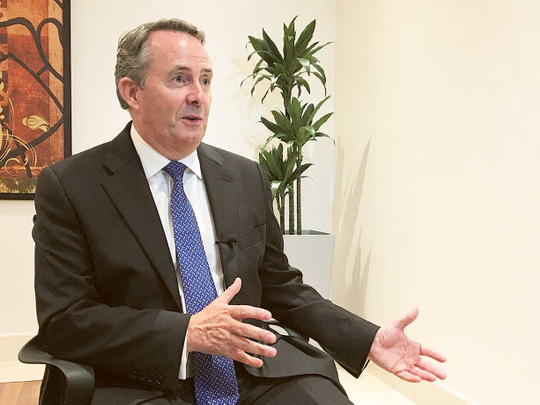
Dubai: The United Kingdom (UK) wants a strong European Union (EU), but seeks to “rejoin the rest of the world”, Dr Liam Fox, the UK’s Secretary of State for International Trade, said on Sunday evening.
Dr Fox, on a visit to the UAE, said in an interview with Gulf News, “We’ll be making it very clear that we want the European Union to succeed — we don’t want to be governed by the European Union but we want it to be a strong partner for us — but that we see a future in the rest of the world.
“There are emerging markets out there, there are maturing markets out there and we want to be absolutely at the forefront of the charge when it comes to getting access to those markets and getting full bilateral trade with those markets.”
Dr Fox, a prominent supporter of Brexit, said Britain wanted to be a global champion for free trade, it would not rush its exit from the European Union. That contrasts with calls from some European leaders for the UK to start the process of leaving the EU quickly.
“We want to get things moving as soon as we’re ready,” said Dr Fox. “Remember, for example, that Britain’s not done international trade for 43 years. That’s been an EU responsibility. We’ve set up a new department for international trade. It takes time to bring together the body of knowledge and the individuals to be able to carry out those negotiations in the future, so we’re taking our time to get it right.
“We don’t want to do it too quickly, because we might not be ready, but we don’t want to leave it too long either. We’re as keen to get the certainty on that as anyone else. But we want a good exit, not necessarily the quickest exit.”
Shortly after the UK voted to leave the EU in a referendum on June 23, EU leaders called for the British government to trigger Article 50 — the process by which will trigger formal exit negotiations — as soon as possible.
And although European Commission President Jean-Claude Juncker accepted it would take several months for the UK to prepare when he appointed the EU’s chief negotiator in July, commission vice-president Valdis Dombrovskis two weeks ago reiterated calls for the UK to trigger Article 50 “without undue delay”.
Dr Fox said, “We would like to leave with as little disruption to global trade as possible, preferably zero disruption, and then Britain looking forward to an even more liberal Europe in the future.
“At a time when there’s not much leadership for the concepts of free trade globally, Britain will want to assume that position.”
He said he was confident other nations would seek to trade with the UK, saying it was the fifth biggest world economy and the second-largest in the EU.
The UK’s exit from the EU “doesn’t represent Britain looking inward but is in fact is the beginning of Britain looking much more outwards, having our horizons widened beyond the European Union,” he said. “We are not leaving the EU, we are rejoining the rest of the world.”
Dr Fox said leaving the EU would allow the UK to trade more widely, and promote global trade liberalisation.
His visit to the UAE — one of the UK’s most important trade partners outside Europe — is part of a wider series of visits that have already taken him to the US and India.
“We’re looking at all the potential partners we’ll have before we leave the European Union and after we leave the European Union. Of course our trading relationship may change — remember, we’re not allowed to negotiate free trade agreements while we’re inside the European Union, but we will want to discuss with our trade partners how we can liberalise trade as much as possible so that we can develop that relationship while we’re outside the EU.”
He added, “We’re not allowed to have formal negotiations, but that doesn’t preclude us from looking at any tariffs and non-tariff barriers that exist that we might to see disappear in future. I think that we should all want to see them disappear, whether we’re in the European Union or not, but we may have opportunities when we’re not in the European Union to be able to have a more independent view on that.
“There will be a number of possibilities opening up and it would be strange if we didn’t examine what the scope of those was at the present time, without entering into formal negotiations.
“I’ll be going to the WTO [World Trade Organisation] in Geneva next week to speak to them about how we see the future, why we think that the voices of voices of protectionism are dangerous, why we think we need an open, forward-looking and liberal trading environment for the sake of prosperity, for the sake of elimination of poverty and also for the maintenance of security.”












